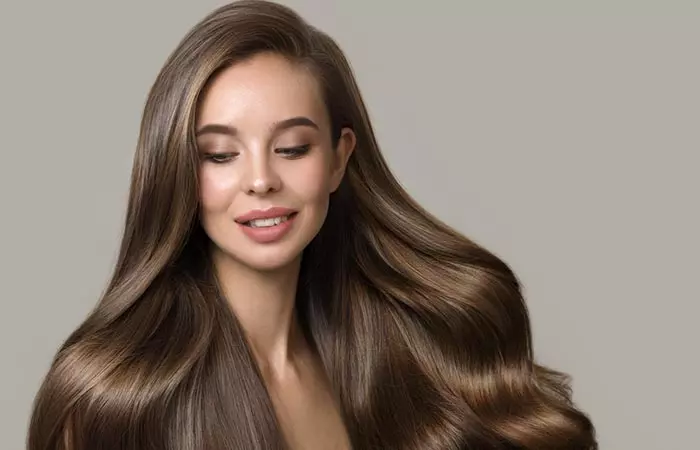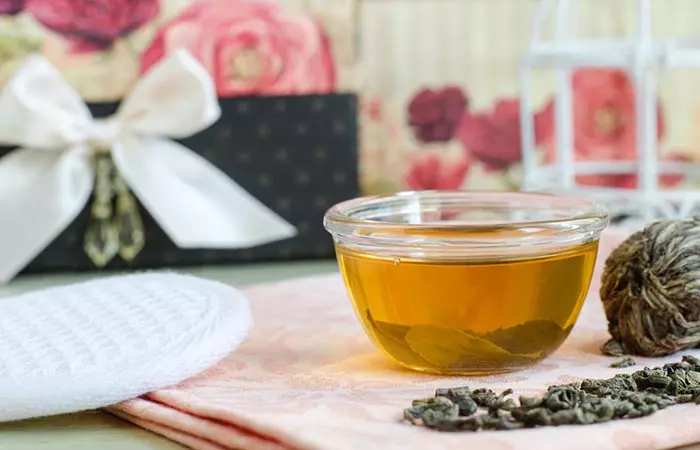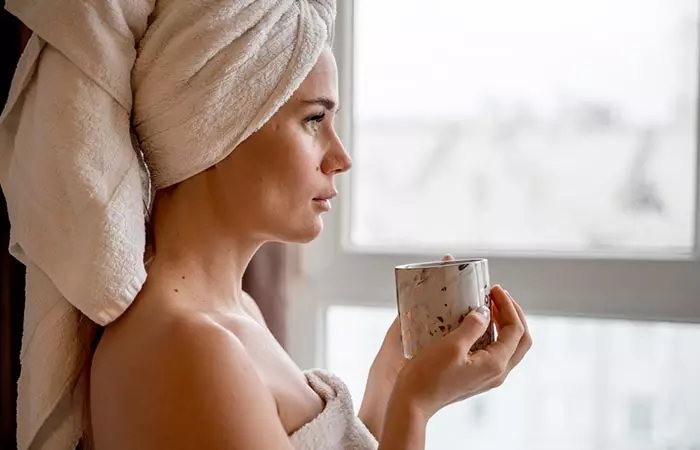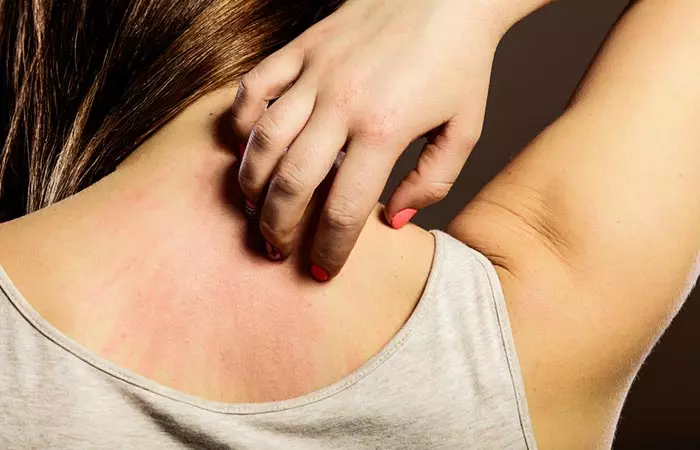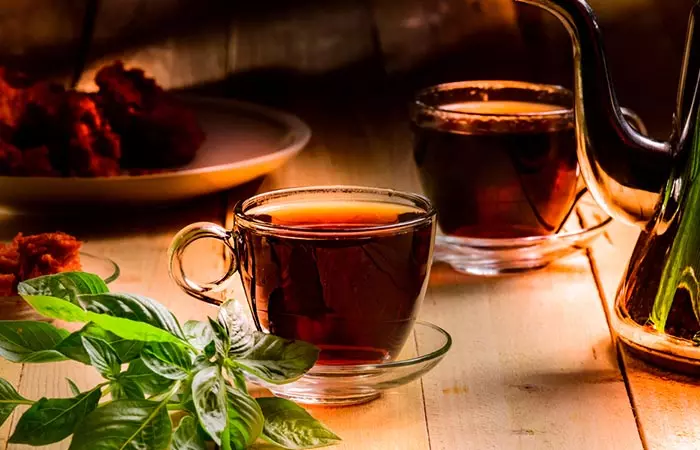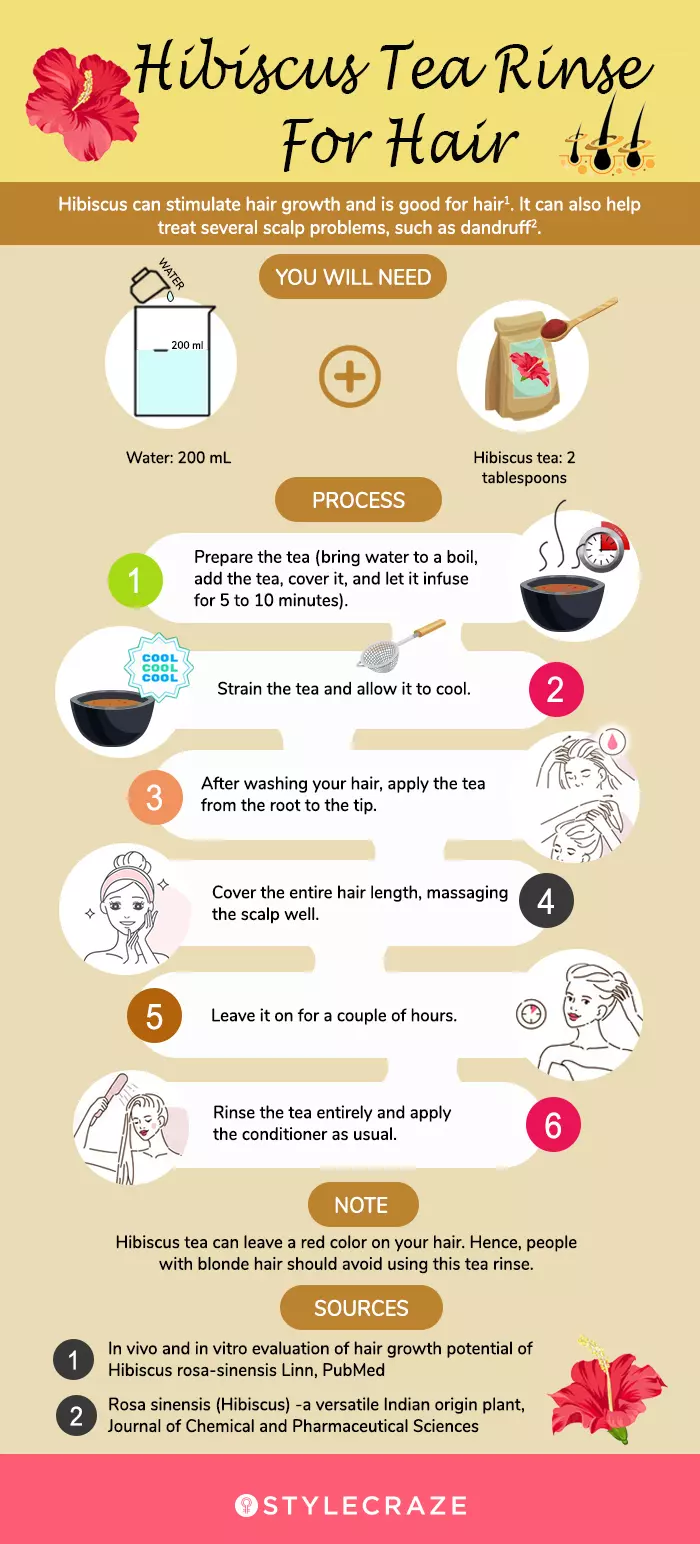In this article, we will be looking at the potential benefits of tea rinse for hair, its side effects, how to use it, and more. Continue reading to know more.
Why Use A Tea Rinse For Hair?
A tea rinse is a herbal rinse that can improve the hair’s appearance and feel. It is a blend of herbs and water that keeps the hair healthy. Here are a few reasons to use tea rinses for the hair (1):
Types And Benefits Of Tea Rinses For Hair
Green Tea: It contains flavonoidsi Naturally occurring substances found in many fruits and vegetables that protect the cells from oxidative damage and prevent diseases. that can stimulate hair growth (2). Research found that green tea extract showed better results than minoxidil 2.5% in promoting hair growth (3). Black Tea: It contains tanninsi A class of water-soluble compounds found in plants that help separate protein from a solution to help remove contaminants. that can brighten hair color intensity (4). Black tea contains caffeine that can help prevent androgenic alopeciai Permanent, genetic hair loss condition that affects the top and crown of the head in both men and women. and hair loss (5). Rosemary: It is used in herbal tea blends and is known for its antifungal properties (6). Rosemary tea benefits for hair include solving conditions like baldness, dandruff, and thinning. This may help keep the scalp clean and healthy. It can also turn gray hair darker. Rosemary oil may also improve androgenic alopecia (7).
Chamomile: It contains antioxidants and exhibits antimicrobial properties, making it ideal for topical use. Applying chamomile tea can reduce inflammation and soothe scalp irritation and conditions like eczemai A common chronic skin condition characterized by dry skin, irritation, inflammation, and red rashes. and dermatitisi An umbrella term for a variety of skin conditions involving itchy skin, dry skin, rashes, blisters, and crusts. (8). Research shows that chamomile can inhibit 5-alpha reductase and stimulate hair growth and prevent androgenic alopecia (9). Hibiscus: It may help stimulate hair growth. A mice study found hibiscus to induce hair growth (10). The leaves and flowers of the hibiscus plant are said to fight dandruff (11). They also improve the overall health and appearance of the hair. Peppermint: Peppermint oil is known to stimulate hair growth. It also has antimicrobial and antifungal properties (12). These properties may keep the scalp clean. Lavender: Lavender oil contains linalyl acetatei An organic compound found in many spice plants and flowers. It is widely used as a fragrance material. , linalooli A floral, colorless, and spicy terpene alcohol used as a fragrant ingredient. It is mainly found in citrus fruits. , and geranioli A terpene alcohol that occurs in the essential oils of aromatic plants used in hair styling gels, moisturizers, and conditioners. that help manage alopecia areata and promote hair growth (13). Nettle: Stinging nettle (Urtica dioica) leaves are traditionally used for treating hair loss (14). More research is needed to prove its hair benefits. Sage: Anecdotal evidence suggests that sage prevents premature graying.
Nkosazana, a blogger, recounted her experience with tea rinses in her blog. She noted, “I tried Senna leaves differently, after shampoo/co-wash, I’d throw the tea rinse on hair and put the deep conditioner over the tea to work together and then rinse out, my hair absolutely loves it! Hair is softer, hardly breaks and the shedding is quite low (i).” You can use any of the herbs or a blend of several herbs to prepare a DIY tea rinse for your hair. Here are the instructions.
How To Wash Your Hair With A Tea Rinse
Prep Time 30-45 minutes You Will Need
2 teaspoons of tea herbs 1 ½ cups of water
Note: Adjust the quantity as per the hair length. Procedure How Often Once every week You can also use the tea rinse to prepare the scalp for a deep conditioning treatment. After shampooing, wash the scalp and hair with the tea rinse, put on a shower cap, and leave it on for 15-30 minutes. Follow up with a deep conditioning mask, conditioner, cream, or serum and leave it on for another half hour before rinsing off the hair with cool water.
Side Effects Of Tea Rinses
Using tea rinses too often can make the hair dry and brittle. Hence, use them not more than once a week. The herbs may also trigger allergic reactions and cause irritation, itching, hives, and inflammation. Ensure you do a patch test to prevent allergic reactions. Of all the herbs mentioned in the above list, black tea contains the highest caffeine levels – a compound proven to promote hair growth. You can try a tea rinse made of black tea to promote hair growth. Let’s find out how it works.
Black Tea To Reduce Hair Shedding
Black tea contains caffeine (5). A study found caffeine to stimulate hair growth by increasing the anagen phase (growth phase) (15). Another reason for hair shedding can be scalp inflammation and itching, and caffeine can help calm an itchy scalp. Stress is one of the most common factors contributing to hair loss. Black tea is also known to relieve stress, preventing hair shedding (16). You may apply a homemade hair rinse made of black tea or consume the tea to manage hair fall. You may either wash it off or leave it on your hair.
Can You Leave A Tea Rinse On Your Hair?
Yes. You can leave the tea rinse on the hair. Tea rinses can unclog pores, cleanse the scalp, and nourish the hair follicles. Anecdotal evidence suggests that massaging the scalp after using the tea rinse can clear the pores and remove dirt and other impurities. Massaging may also stimulate blood flow and induce hair growth. What does tea rinse do for natural hair? A tea rinse (depending on the tea you use) fights dandruff and enhances curls. It also soothes an itchy or irritated scalp. It adds shine to natural hair and helps manage product residue and buildup. Can I use a tea rinse instead of shampoo? A tea rinse can reduce itching and shedding, prevent dandruff, increase hair shine, and promote hair growth. But, if you use a lot of hair products, it might not be as effective as a shampoo in removing product residue and buildup. Are non-caffeinated teas good for hair rinses? Yes. Non-caffeinated teas can soothe inflammation, reduce frizz and dryness, and improve scalp health.
